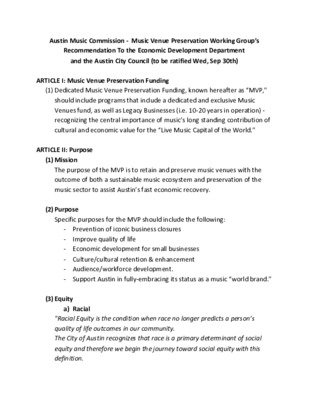Backup — original pdf
Backup

Austin Music Commission - Music Venue Preservation Working Group’s Recommendation To the Economic Development Department and the Austin City Council (to be ratified Wed, Sep 30th) ARTICLE I: Music Venue Preservation Funding (1) Dedicated Music Venue Preservation Funding, known hereafter as “MVP,” should include programs that include a dedicated and exclusive Music Venues fund, as well as Legacy Businesses (i.e. 10-20 years in operation) - recognizing the central importance of music’s long standing contribution of cultural and economic value for the “Live Music Capital of the World.” ARTICLE II: Purpose (1) Mission The purpose of the MVP is to retain and preserve music venues with the outcome of both a sustainable music ecosystem and preservation of the music sector to assist Austin’s fast economic recovery. (2) Purpose Specific purposes for the MVP should include the following: Improve quality of life Economic development for small businesses - Prevention of iconic business closures - - - Culture/cultural retention & enhancement - Audience/workforce development. - Support Austin in fully-embracing its status as a music “world brand.” (3) Equity a) Racial "Racial Equity is the condition when race no longer predicts a person’s quality of life outcomes in our community. The City of Austin recognizes that race is a primary determinant of social equity and therefore we begin the journey toward social equity with this definition. The City of Austin recognizes historical and structural disparities and a need for alleviation of these wrongs by critically transforming its institutions and creating a culture of equity." b) Gender “Gender Equity is the condition when gender no longer predicts a person’s quality of life outcomes in our community. We recognize that gender and sexism are particularly problematic in the Music Industry - including, but not limited to, venue ownership, frequency of gigs, income, and economic opportunities, as outlined in the 2015 Austin Music Census. We recognize that gender is a primary determinant of social equity and therefore we begin the journey toward social equity also with this definition.” Any programs developed should include an equity overlay - including an acceptance of this Equity statement, criteria and process supporting it and capacity building opportunities embedded in the application process that furthers the equity mission and creates best outcomes and quality of life for all. Request.) built into final doc *footnote 1 (see Addendum for Equity Guidelines. Overlay available on (4) Funding Funding sources for the MVP should be deliberated and decided by Council and staff. These programs should not be funded by the from the Music portion of Hotel Occupancy Taxes. Live Music Fund ARTICLE III: Administration (1) Program Administrator The Economic Development Department (EDD) should partner in good faith with a third-party administrator, such as the Long Center for the Performing Arts, Austin’s Economic Development Corporation (AEDC), Music Venue Alliance Austin (MVAA) and/or Texas Accountants and Lawyers for the Arts The BBB is not recommended, due to the need for deep case (TALA). management and workforce development as part of the recommended process, as well as stakeholder feedback from their performance with Austin’s disaster relief programs. (2) Scope of Work The purpose of the administration of any programs should align with the Mission and Purposes outlined in ARTICLE I. Funds should be available for rent, insurance, payroll, taxes, inventory, safety measures, utilities, permits/regulation, cost of goods, advertising, capacity building, or other operational or capital reinvestment expenses. *footnote 2 (see Addendum for Program Guidelines.) built into final doc Administration of the MVP programs should also include: - Direct case management and workforce development included in program service, by the administrator OR by consultants. Costs could be included in administrative contract or found in auxiliary City budgets (i.e. Workforce Development.) - Partnership between EDD with all parties involved. (3) Delivery Timeline Funds must be available within the month of October. Therefore, any administration process that cannot be fully functional on that timeline should not be considered. Turnkey Goals: - Grants to release within 30 days of administrator contract signature. - Grants open for 20-30 days. - Grants administered within the following 30 days. Turnkey operations for Phase 1 grants on 90-days. Phase 2 grants and reapplication in 60 day-cycles and upon reassessment of needs. (4) Finances $12M over 12 months will help stabilize businesses in Austin that meet the criteria used in the Resolution No 202001xx-xx (Jan 2020 land code update) to define a live music venue. Applications will be the result of regular analysis as scale and need continues, which will vary from venue to venue - including risk assessment, SWOT, business development and other best business counseling practices. Guidelines.) built into final doc *footnote 3 (see Addendum for CSAP <<< End of Recommendations>>> <<<< End of Recommendations>>> <<<< End of Recommendations>>> ADDENDUM (1) EQUITY GUIDELINES Documents supporting ARTICLE II:(3) Equity Statement and exploring process. ● Goal is to create market facing solutions that create best practices - emphasizing operational guidelines and business policy mechanisms that are sustainable, implementable and achievable. ● For Racial Equity, please see EQ Austin’s “MVP EDI Overlay” as reference. ● “Gender Equity” in development. (2) PROGRAM GUIDELINES Context supporting ARTICLE II: (2) Purpose and exploring process. supportive. Goal is SUCCESS. ● Process isn’t ● Focus on sustainability. punitive , but rather Venues need to be in competitive shape, in order to help create broader economic recovery & job growth in Austin. ● “MMA Guidelines” in development. <<<End of Addendum>>> <<<End of Addendum>>>